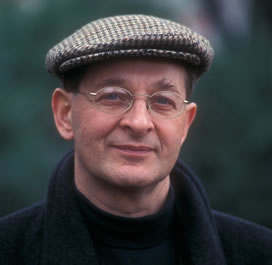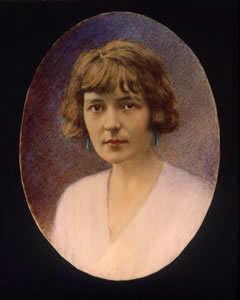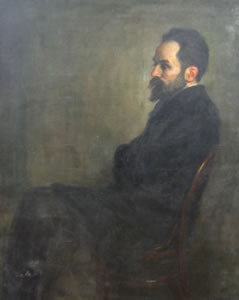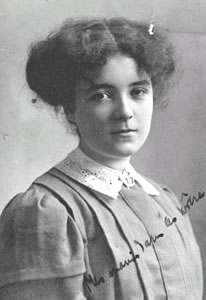De Amerikaanse dichter en schrijver Edward Estlin Cummings werd geboren in Cambridge, Massachusetts op 14 oktober 1894. Zie ook mijn blog van 14 oktober 2008 en ook mijn blog van 14 oktober 2009.
the boys i mean are not refined
the boys i mean are not refined
they go with girls who buck and bite
they do not give a fuck for luck
they hump them thirteen times a night
one hangs a hat upon her tit
one carves a cross on her behind
they do not give a shit for wit
the boys i mean are not refined
they come with girls who bite and buck
who cannot read and cannot write
who laugh like they would fall apart
and masturbate with dynamite
the boys i mean are not refined
they cannot chat of that and this
they do not give a fart for art
they kill like you would take a piss
they speak whatever’s on their mind
they do whatever’s in their pants
the boys i mean are not refined
they shake the mountains when they dance
why must itself up every of a park
why must itself up every of a park
anus stick some quote statue unquote to
prove that a hero equals any jerk
who was afraid to dare to answer “no”?
quote citizens unquote might otherwise
forget(to err is human;to forgive
divine)that if the quote state unquote says
“kill” killing is an act of christian love.
“Nothing” in 1944 AD
“can stand against the argument of mil
itary necessity”(generalissimo e)
and echo answers “there is no appeal
from reason”(freud)–you pays your money and
you doesn’t take your choice. Ain’t freedom grand
Als
Als sproetjes lieftallig zijn, en dag nacht is,
En mazelen mooi zijn en een leugen geen leugen is,
Dan zou ’t leven heerlijk zijn,–
Maar de dingen zouden niet kloppen
Want in zo’n droeve staat
Zou ik geen ik zijn.
Als de aarde hemel is, en nu toen is,
En verleden heden is, en vals waar is,
Dan klopt dit in zekere zin,
Al zou ik in twijfel zijn,
Want met zo’n voorwendsels
Zou jij niet jij zijn.
Als angst moedig is, en globes vierkant zijn,
En vuil proper is, en tranen vrolijk zijn
Dan zou alles fraai lijken,–
Toch zou iedereen vertwijfeld zijn,
Want als hier daar zou zijn
Dan zouden wij geen wij zijn.
Vertaald door Lepus

E. E. Cummings (14 oktober 1894 – 3 september 1962)
De Hongaarse schrijver Péter Nádas werd geboren op 14 oktober 1942 in Boedapest. Zie ook mijn blog van 14 oktober 2008 en ook mijn blog van 14 oktober 2009.
Uit: A Lovely Tale Of Photography (Vertaald door Imre Goldstein)
“SILENCE On the black-lacquered short column the flowers are displayed in a new bowl. They may be the same kinds of flowers, though they are arranged differently.
And there is a voice.
“The rebellious soul afflicts itself with thirst, hunger, and silence, but the rational world can be neither punished nor driven off its course. People shamelessly eat and drink, say the proper words, belch and fart — because they are digesting — and under the cover of night they beget children; minute follows minute, the hours pass, filling up with themselves, and who would brood over time that is out of joint?”
Kornélia is standing in the open door of the terrace; an anxious Henriette is behind her.
“Kornélia, my sweet, I beg you, hold on to your senses.”
And there is also a voice.
“A daydreaming Kornélia was standing in the open door of the terrace, loyal Henriette behind her. Two lovely human statues. One is rebellious silence itself, the other the guardian angel of bounden duty.”
And then, on the steps leading to the terrace, appears the elderly lady, accompanied by the young man who had so much reminded Kornélia of Károly.
“Please, let us go and welcome them.”
While they proceed, the voice is heard.
“Of course we must immediately note that neither the girl nor the young man had desired this meeting; it was a scheme — to break Kornélia’s morbid silence — devised by Henriette and abetted by the wily Chief Surgeon.”
Henriette and the elderly lady exchange amiable smiles and, by way of greeting, as befits the situation, bow their heads. The girl and the youth remain aloof; as their partners halt, so do they, to avoid a collision, yet they appear not to see each other.
“We’ve been out for a whole hour, man ist aber nicht zu erfüllen, von diesem dahinschleichenden, wunderbaren Wetter. How do you like this wonderful weather we’re having?”
“In den Bergen gibt es ja immer das leichte Lüftchen, nicht mehr als einen leisen Hauch, just enough to cool off this late heat wave. Kornélia is absolutely overjoyed.”

Péter Nádas (Boedapest,14 oktober 1942)
De Amerikaanse dichteres, essayiste, critica en feministe Katha Pollitt werd geboren op 14 oktober 1949 in New York. Zie ook mijn blog van 14 oktober 2008 en ook mijn blog van 14 oktober 2009.
Lot’s Wife
Trudging behind the broad backside of God
she hums her useless tune
Oh little black dress at the back of the closet,
who will crush you now against his chest?
Green Italian boots in a midnight window,
a scrabble of rats, a hand
lit from within like a tulip—
Who dashes down that street to meet her lover?
Who sits in the movie theatre
coiled, silent, a black cat?
The dark-eyed daughters idly stroke their breasts.
A jackal crouches in shadow, hungry for salt.
At the base of a dune that heaves to the blank horizon
a palm tree shrugs its shoulders
as if to say: Well, what did you expect?
What I Understood
When I was a child I understood everything
about, for example, futility. Standing for hours
on the hot asphalt outfield, trudging for balls
I’d ask myself, how many times will I have to perform
this pointless task, and all the others? I knew
about snobbery, too, and cruelty—for children
are snobbish and cruel—and loneliness: in restaurants
the dignity and shame of solitary diners
disabled me, and when my grandmother
screamed at me, “Someday you’ll know what it’s like!”
I knew she was right, the way I knew
about the single rooms my teachers went home to,
the pictures on the dresser, the hoard of chocolates,
and that there was no God, and that I would die.
All this I understood, no one needed to tell me.
the only thing I didn’t understand
was how in a world whose predominant characteristics
are futility, cruelty, loneliness, disappointment
people are saved every day
by a sparrow, a foghorn, a grassblade, a tablecloth.
This year I’ll be
thirty-nine, and I still don’t understand it.

Katha Pollitt (New York,14 oktober 1949)
De Nieuw-Zeelandse schrijfster Katherine Mansfield werd geboren op 14 oktober 1888 in Wellington. Zie ook mijn blog van 14 oktober 2006 en ook mijn blog van 14 oktober 2007 en ook mijn blog van 14 oktober 2008 en ook mijn blog van 14 oktober 2009.
Uit: The Young Girl
“In her blue dress, with her cheeks lightly flushed, her blue, blue eyes, and her gold curls pinned up as though for the first time–pinned up to be out of the way for her flight–Mrs. Raddick’s daughter might have just dropped from this radiant heaven. Mrs. Raddick’s timid, faintly astonished, but deeply admiring glance looked as if she believed it, too; but the daughter didn’t appear any too pleased–why should she?–to have alighted on the steps of the Casino. Indeed, she was bored–bored as though Heaven had been full of casinos with snuffy old saints for croupiers and crowns to play with.
“You don’t mind taking Hennie?” said Mrs. Raddick. “Sure you don’t?
There’s the car, and you’ll have tea and we’ll be back here on this step– right here–in an hour. You see, I want her to go in. She’s not been before, and it’s worth seeing. I feel it wouldn’t be fair to her.”
“Oh, shut up, mother,” said she wearily. “Come along. Don’t talk so much. And your bag’s open; you’ll be losing all your money again.”
“I’m sorry, darling,” said Mrs. Raddick.
“Oh, do come in! I want to make money,” said the impatient voice. “It’s all jolly well for you–but I’m broke!”
“Here–take fifty francs, darling, take a hundred!” I saw Mrs. Raddick pressing notes into her hand as they passed through the swing doors. Hennie and I stood on the steps a minute, watching the people. He had a very broad, delighted smile.
“I say,” he cried, “there’s an English bulldog. Are they allowed to take dogs in there?”
“No, they’re not.”
“He’s a ripping chap, isn’t he? I wish I had one. They’re such fun. They frighten people so, and they’re never fierce with their–the people they belong to.” Suddenly he squeezed my arm. “I say, do look at that old woman. Who is she? Why does she look like that? Is she a gambler?”

Katherine Mansfield (14 oktober 1888 – 9 januari 1923)
De Duitse dichteres, schrijfster en filosofe Margarete Susman werd geboren op 14 oktober 1872 in Hamburg. Zie ook mijn blog van 14 oktober 2009.
Uit: Davids Tod
(Ein großes dunkles Gewölbe; links schwach erhellt auf prunkvollen Bett der sterbende König mit geschlossenen Augen.
Sonst ist nichts im Zimmer zu erkennen. Im Hintergrund recht zusammengekauert Abisag von Sunem)
David:
Schatten des Todes riesengroß
Umschwirren mein Haupt.
Was sind wir? Rinnender Sand,
Verwehen, Verstieben,
Hinsinkendes Nichts –
Und die uns binden, die uralten Engel des Lichts
Und sammeln die Häufchen rinnenden Sandes
Zum Anschaun des ewigen Landes –
Wer begriff ihr heiliges Band
In solcher Stunde? –
Wer – wer vermag aus des Abgrunds Grunde
Zu lieben?
Wo ist sie, die leichte blühende Flamme
In tausend Gestalten,
In der ich mich fand?
Hier ist düsteres Land.
Irrend und schwirrend, gestaltlos wogend,
Flackernd gleitet es um mich her.
Will es sich bilden? will es mich bilden?
Ich weiß seinen Namen nicht mehr.
Es hat mich zu tief in sich selbst gezogen,
Es hat mir zu viele Gestalten von mir gelogen.
Wer bin ich? Was hält mich die diesem Gefilden?
Wo ist sie, die stumme verhüllte Gestalt
In mir, die mich trüge?
Des Meinen klare Gewalt?
Wo bist Du mein Bruder? Ich sehe Dich nicht.
Du verrinnst mir in Dunkel und Licht –
Wo sind sie – wo sind Deine heilig geliebten Züge?
Weh mir – ich finde nur Schatten,
Ich finde nur Geister,
Wo ist, der sie schafft?
Wo ist er, ihr einig weisender Führer,
Der Schatten lebenspendender Berührer,
Daß ich zu seinen Füßen sinke,
Seine Klarheit trinke
In lebendigem reinem Ermatten?
Wehe – dichter und dichter
Umdrängt mich der Schatten
Atembeklemmende Todesgewalt –
(Er erblicht Abisag, die in den Lichtkreis tritt)
Gestalt! Gestalt!
Welch ewiger Strahl
Von göttlicher Reine zerreißt die Nacht!
Ein Strom lebendiger Tränen
Entstürzt dem geblendeten Aug
Und ich sehe.
Ich sehe Dich, o Schwester –
Aus ewiger Wogen Nacht
Rannst Du zusammen
Vor meiner lebendigen Seele.
Und um Dich ordnet sich sanft die Welt,
Die Welt mit unendlicher Bilder
Ruhiger Wonne.
Ich sehe die Sonne,
Der Sterne klare Gestalten
In reinem Kreise Dein Haupt umwalten
Ich seh Deinen Fuß die Erde treten,
Ich sehe Dein Auge glänzen und beten,
Und es blickt mich an:
Mich – und ich bin,
Ich lebe.

Margarete Susman (14 oktober 1872 – 16 januari 1966)
De Poolse schrijver Stefan Żeromski werd geboren op 14 oktober 1864 in Strawczyn in de buurt van Kielce. Zie ook mijn blog van 14 oktober 2006.
Uit: Foreboding: Two Sketches (Vertaald door Else Benecke en Marie Busch)
‘In the darkest corner of the ward, in the bed marked number twenty-four, a farm labourer of about thirty years of age had been lying for several months. A black wooden tablet, bearing the words ‘Caries tuberculosa’ hung at the head of the bed, and shook at each movement of the patient. The poor fellow’s leg had had to be amputated above the knee, the result of a tubercular decay of the bone. He was a peasant, a potato-grower, and his forefathers had grown potatoes before him. He was now on his own, after having been in two situations; had been married for three years and had a baby son with a tuft of flaxen hair. Then suddenly, from no cause that he could tell, his knee had pained him, and small ulcers had formed. He had afforded himself a carriage to the town, and there he had been handed over to the hospital at the expense of the parish.
He remembered distinctly how on that autumn afternoon he had driven in the splendid, cushioned carriage with his young wife, how they had both wept with fright and grief, and when they had finished crying had eaten hard-boiled eggs: but what had happened after that had all become blurred—indescribably misty. Yet only partially so.
Of the days in the hospital with their routine and monotony, creating an incomprehensible break in his life, his memory retained nothing; but the unchanging grief, weighing like a slab of stone on a grave, was ever present in his soul with inexorable and brutal force during these many months. He only half recalled the strange wonders that had been worked on him: bathing, feeding, probing into the wound, and later the operation. He had been carried into a room full of gentlemen wearing aprons spotted with blood; he was conscious also of the mysterious, intrepid courage which, like a merciful hand, had supported him from that hour.”

Stefan Żeromski (14 oktober 1864 – 20 november 1925)
Portret door Eligiusz Niewiadomski, 1900
De Nederlandse schrijver Daniël Rovers werd geboren in Zelhem op 14 oktober 1975. Rovers groeide op in het gehucht Velswijk, in de Gelderse Achterhoek. Hij studeerde Nederlands en wijsbegeerte in Nijmegen en woonde tot 2008 in Brussel, sindsdien in Amsterdam. In 2005 verscheen de essaybundel Bunzing. De roman Elf (2010) – volledige titel: Elf levens – beschrijft de levens van elf mensen die in Brussel wonen, levens die onderling verbonden blijken. In 2011 ook verscheen de roman Walter, die het leven beschrijft van een Noord-Brabantse seminarist die volwassen wordt in de jaren vijftig en zestig.
Uit: Walter
“In de zomer, als het eerste ochtendlicht onder de gordijnen de kamer in kierde, hoefde Walter niet gewekt te worden. Als je goed je best deed, dan kon je de zon horen schijnen, had Jos gezegd, maar als Walter luisterde, mond en ogen dicht, hoorde hij in de beuken voor het huis alleen het gekwetter van de koolmezen en een paar lijsters daartussen, en ja, een botvink met het begin van een melodie. En onder het fluiten van de vogels, gedempt door de dakpannen en de muren van de stal, het geloei van het vee. Onzalig doch niet ongelukkig, gemeenschap op vier poten, herkauwers.
’s Winters was het anders, dan hield de slaap je vast in de nacht: het donker bewoond door de vuurvliegjes die je ziet als je op een zomermiddag je ogen voor een moment ferm sluit. Op-stáán, op-stáán, op-stáán. Om zes uur klopte moeder driemaal op de houten achterwand van het bed, zodat het dreunde in het duister waarin hij verscholen lag. Een specht boorde in zijn schedel.
Twee ledikanten stonden in de kamer. Walter sliep naast zijn broer Jos, Johan en kleine Jan deelden het andere bed. In de vakanties moesten zij opschikken als grote Jan thuiskwam van de kostschool in Huijbergen, want zijn blozende, brede lijf had ruimte nodig. Jos reutelde van onder de opgebolde lakens; de open monden van kleine Jan en Johan verzamelden klompsokkenlucht. Walter richtte zich op. Wie wilde er nog in bed liggen nu het licht met putsen tegelijk over het erf werd uitgegoten?
Op de rieten stoel naast het bed lagen zijn broek, hemd, overhemd, vest en sokken; als het nodig was kon hij ze aantrekken op de tast. Zijn vingers herkenden de zachte kriebel van de wol, de koelte van het katoen. Met het vest in zijn rechterhand verliet hij de kamer en liep de brede, met tapijt overtrokken trap af, over de tegels van de hal, door de voorkamer tot aan de drempel van het washok. Daar sliepen nog zijn schoenen, nodig tegen de koelte die van beneden kwam. De Surinamerivier, het olifantengeweer, de glibberige vloer van de koeienstal. Droom heette het avontuur dat ’s nachts in slaap plaatsvond. Hij kletste een weinig water in zijn gezicht.”

Daniël Rovers (Zelhem, 14 oktober 1975)

























